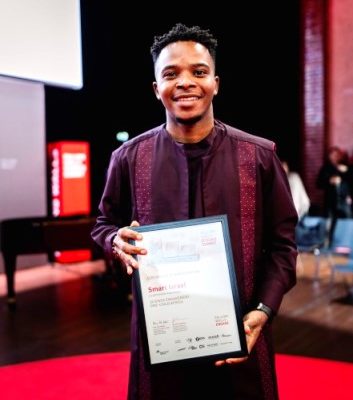As world leaders gear up for UN Sustainability Week, a Nigerian changemaker at African Leadership University has developed an innovative solution to drive agricultural sustainability across Africa, and advance global progress toward achieving the Sustainable Development Goals (SDGs).
African Leadership University (ALU) student Smart Israel from Nigeria – whose social venture, Smartel Agric-tech, uses cutting-edge hydroponic technology and artificial intelligence-based innovation to build climate-resilient food systems – has called on policymakers attending the United Nations’ Sustainability Week to support African innovators unlocking Africa’s vast agricultural potential.
RELATED: Nigerian, African farmers not leveraging AgriTech innovations – New Report
UNGA Sustainability Week, which convenes from 15-19 April, will take stock of the world’s progress in achieving the SDG agenda by 2030. Taking centre stage in discussions will be Sustainable Development Goal 2: end hunger, achieve food security and improved nutrition, and promote sustainable agriculture.
Nigeria’s agricultural sector contributes around 22.3% to the country’s GDP and employs about 70% of its labour force. According to a report by McKinsey, Nigeria is among the top three African countries with the most untapped agricultural potential, which largely stems from challenges related to productivity, infrastructure, and access to finances.
Looking to solve food insecurity in Nigeria, ALU Software Engineering student Israel founded Smartel Agri-tech in 2021. The startup is revolutionising agricultural production and addressing the issue of food shortage in Nigeria through cutting-edge hydroponic technology and vertical farming. Smartel’s stackable container systems – which resemble portable greenhouses – cultivate crops indoors using a water-based nutrient solution, rather than soil. Its smart irrigation and IoT sensors, which leverage artificial intelligence, monitor and regulate water consumption, ensuring optimal crop growth while using 90% less water than conventional farming.
ALU student and Smartel founder Smart Israel said: “My time at ALU has taught me that it is our responsibility as the next generation of African leaders to drive socioeconomic development.
“Smartel Agri-tech was born from a vision of a future where everyone has access to food security, unaffected by climate, geographical constraints, or limited resources. Our mission today leverages cutting-edge technology to enable local farmers to grow their crops in ways that are both sustainable and efficient. The journey thus far has seen remarkable strides toward achieving the Sustainable Development Goals, but to truly tap into Africa’s vast agricultural promise and take significant steps towards eradicating world hunger, it’s imperative for world leaders to invest in innovative solutions that make these advancements broadly accessible.”
The hydroponic systems enable year-round, climate-resilient crop cultivation in any location, including arid and urban areas, ensuring that fresh, healthy food is accessible to smallholder farmers and local communities. Smartel also provides farmers with training and support in setting up the hydroponic systems, and runs a platform through which they can sell and deliver their produce to consumers. With their team of 16 employees, they have so far helped 380 farmers with training and hydroponic systems installation in Nigeria, and produce 16 tonnes of fresh produce.
Veda Sunassee, CEO of ALU, said: “Smart represents the true spirit of the African Leadership University: ambitious, creative, and altruistic. We are so proud to see the success of his venture unfold, and to be a part of his entrepreneurial journey. ALU’s impact is best understood through the actions of our students and alumni, and we are committed to instilling in them the right skills and mindset needed to spearhead positive change in the 21st century. The story of Africa’s youth is one of relentless advancement and dynamic promise. It’s not enough for the world to merely recognize this; it must strive to keep pace with it.”
Smartel Agri-tech is changing the game in advancing food security and economic empowerment among Nigerians by reducing their reliance on unpredictable weather patterns, which are exacerbated by the effects of climate change, and traditional agricultural practices, which contribute to land degradation, deforestation, and carbon emissions associated with food transportation.
Smartel has been selected to participate in the World Food Programme’s 12 – month Sprint Programme. Delivered via the Agricultural Innovation for Climate Resilience Programme, a partnership between the WFP Innovation Accelerator and the Deutsche Gesellschaft für Internationale Zusammenarbeit GmbH (GIZ), it provides selected ventures with mentorship, access to a global network of stakeholders, and up to $150,000 in equity-free funding.
ALU, which has a state-of-the-art campus in Kigali, Rwanda, and a college in Pamplemousses, Mauritius, is helping train Africa’s leaders and visionaries of tomorrow, through a mix of mission-led study and work experience. It aims to develop 3 million ethical and entrepreneurial African leaders by 2035. So far, more than a quarter of their alumni have started 140 unique ventures, created more than 44,000 jobs, and raised almost US$6 million.
In addition to Smartel Agri-tech, Smart Israel founded Menava, a health tech platform improving access to primary health care for Africa’s underserved communities, which has raised US$70,000 to date, and One-Child Africa, a non-profit enhancing STEM education for young learners, particularly girls, across Africa by providing innovative STEM kits and boardgames, as well as workshops and outreach programmes.
Israel is a Young Leader at the UN ECOSOC Youth Forum, was part of the winning team in the East African Universities’ Debating Championship 2023, and has received numerous accolades including the 2023 Diana Award. Smart is also the youngest recipient of the Falling Walls Science Engagement of the Year Award by the Falling Walls Foundation, Germany, and the current Young Environment Ambassador by Best Seller Foundation.
































